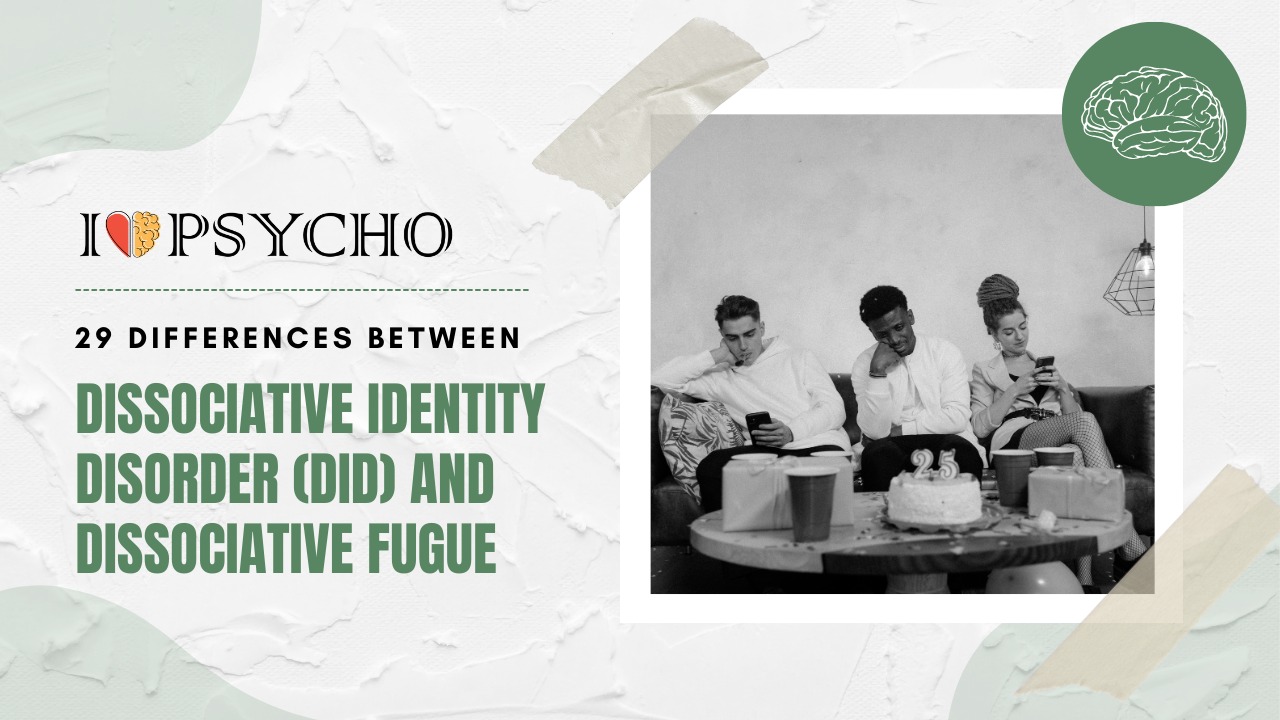The psychiatric illnesses of Dissociative Identity Disorder (DID) and Dissociative Fugue disturb a person’s identity, memory, and awareness. Their main elements, length, and presentation differ greatly, despite their commonalities.
A complicated disorder called DID, formerly known as Multiple Personality Disorder, is characterized by two or more different and persistent personality states or identities in one person. Often called “alters,” these identities may have different memories, behaviors, and perceptions and often stem from serious trauma or abuse. Memory gaps and switching between alters might cause DID patients to have a fractured self-image. Psychotherapy to integrate various identities is usual for DID.
But Dissociative Fugue is a rarer variant of Dissociative Amnesia. It includes sudden and unexpected travel or leaving one’s home or customary environment, frequently with no memory of one’s history. A fugue condition can cause people to take on a new persona and do deliberate tasks. Extreme stress, trauma, or psychological difficulties cause dissociation. Dissociative fugue episodes are usually brief and could end spontaneously, revealing the actual self.
Another difference is these situations’ longevity. Chronic DID symptoms last for years. Dissociative Fugue involves short bouts of dissociation, lasting hours to days, followed by a return to normal identity and location.
In essence, Dissociative Identity Disorder and Dissociative Fugue both alter identity and memory, but they vary fundamentally. DID contains numerous identities and is chronically entrenched in traumatic trauma, whereas Dissociative Fugue comprises short periods of forgetfulness, generally provoked by stress, that resolve spontaneously. Accurate diagnosis and treatment of dissociative disorders require understanding these variances.
|
S.No. |
Aspects |
Dissociative Identity Disorder (DID) |
Dissociative Fugue |
|
1 |
Definition |
A complex mental disorder characterized by the presence of two or more distinct identities or personality states. |
A dissociative disorder characterized by sudden, unexpected travel or wandering, often accompanied by amnesia. |
|
2 |
Core Symptom |
Presence of multiple distinct identities or personality states, each with its own behaviors and memories. |
Sudden and unplanned travel away from one’s usual environment, often with amnesia for the past. |
|
3 |
Alters (Identities) |
Multiple distinct identities, each with a unique sense of self and memory. |
Singular sense of self, no multiple identities involved. |
|
4 |
Amnesia |
May experience periods of amnesia or time loss when another identity is in control. |
Amnesia typically occurs for the period of the fugue episode. |
|
5 |
Prevalence |
Relatively rare, with an estimated prevalence of 1-2% of the population. |
Less common than DID, with a lower prevalence rate. |
|
6 |
Etiology |
Often linked to childhood trauma and a coping mechanism to deal with extreme stress. |
Often triggered by acute stressors or traumatic events. |
|
7 |
Identity Switching |
Frequent and noticeable switches between different alters. |
No identity switching within a single fugue episode. |
|
8 |
Awareness of Alters |
Alters may or may not be aware of each other. |
A person in a fugue state is typically not aware of their identity loss. |
|
9 |
Identity Integration |
Treatment often aims at integrating the different identities. |
Focuses on resolving the fugue state and recovering lost memories. |
|
10 |
Psychological Distress |
Individuals with DID often experience significant distress due to the disorder. |
Psychological distress is often associated with the fugue state itself. |
|
11 |
Duration of Episodes |
Alters can be present for varying durations, sometimes switching frequently. |
Fugue episodes typically last from a few hours to a few days. |
|
12 |
Diagnostic Criteria |
Diagnosed based on specific criteria outlined in the DSM-5. |
Diagnosed based on specific criteria outlined in the DSM-5. |
|
13 |
Coexistence with Other Disorders |
Often coexists with other mental health conditions, such as depression or anxiety. |
Can coexist with other mental health conditions but is more focused on the fugue state. |
|
14 |
Treatment |
Psychotherapy, especially integration therapy, is a common treatment approach. |
Therapy aims to help the individual recover their lost memories and prevent future fugue episodes. |
|
15 |
Identity Control |
Alters may have varying levels of control over the individual’s behavior. |
During a fugue episode, the person has limited control over their actions. |
|
16 |
Altered Behavior |
Alters can exhibit distinct behaviors, preferences, and skills. |
Behavior during a fugue episode may be out of character or unusual. |
|
17 |
Triggers |
Stress or reminders of traumatic events can trigger identity switches. |
Traumatic events or extreme stressors often trigger a fugue episode. |
|
18 |
Memory Loss |
Alters may experience selective amnesia for events that occurred while another identity was in control. |
Typically, there is amnesia for the entire fugue episode. |
|
19 |
Self-Perception |
Alters may have differing self-perceptions and may not recognize themselves in mirrors. |
Self-perception remains consistent within a single fugue episode. |
|
20 |
Alter Personalities |
Alters may have distinct names, ages, genders, and even accents. |
No distinct personalities or identities during a fugue episode. |
|
21 |
Legal Implications |
Complex legal issues may arise regarding responsibility and legal competency. |
Legal issues primarily related to the consequences of actions during the fugue state. |
|
22 |
Personal History |
Alters may have different memories and may perceive their personal history differently. |
Personal history is often interrupted or fragmented during fugue episodes. |
|
23 |
Onset |
Typically, symptoms begin in childhood and persist into adulthood. |
Fugue episodes usually occur suddenly and are episodic. |
|
24 |
Coping Mechanism |
DID is often considered a coping mechanism for dealing with trauma and stress. |
Fugue is seen as a way to escape overwhelming stress or trauma. |
|
25 |
Personality Integration |
Treatment focuses on integrating the different personalities into a cohesive self. |
Recovery primarily involves recalling lost memories and returning to one’s previous identity. |
|
26 |
Social Relationships |
Relationships may be affected by the presence of multiple alters and their varying behaviors. |
Relationships may be strained due to unexplained absences during fugue episodes. |
|
27 |
Functional Impairment |
Functional impairment can vary depending on the severity of the disorder and the presence of coexisting conditions. |
Impairment is often tied to the fugue episodes themselves. |
|
28 |
Recognizing the Disorder |
Alters may or may not be aware of the DID diagnosis. |
Recognition of the disorder typically occurs after the fugue episode ends. |
|
29 |
Long-Term Prognosis |
Long-term prognosis varies but can improve with appropriate treatment and support. |
Prognosis often depends on addressing the underlying trauma and stressors. |
Frequently Asked Questions (FAQs)
Q1: What are the primary symptoms of Dissociative Identity Disorder (DID)?
DID is characterized by two or more different and lasting personality states, called “alters.” Alters may have different memories, behaviors, and perceptions. Recurrent memory gaps, identity uncertainty, and self-fragmentation are among the symptoms.
Q2: How does Dissociative Fugue differ from DID?
A kind of Dissociative Amnesia, Dissociative Fugue includes unexpected, unplanned travel or leaving one’s customary setting, frequently with the inability to recall one’s former life or identity. In contrast, DID involves several personalities in one person and is not restricted to fugue or amnesia.
Q3: What usually causes Dissociative Fugue?
Dissociative Extreme stress, trauma, or psychological difficulties cause fugue episodes. In the fugue state, an individual may lose touch with their existing identity and surroundings adopt a new one, and engage in intentional behaviors.
Q4: Do Dissociative Fugue episodes resolve themselves? How long do they last?
Dissociative Fugue might last hours or days. They may resolve spontaneously, revealing the person’s genuine identity and whereabouts. Treatment may be needed to address the reasons and avoid further fugue episodes.
Q5: How are DID and DFU treated?
DID treatment focuses on psychotherapy, especially “integration therapy.” This seeks to assist DID patients in uniting their identities and creating a more solid sense of self. In contrast, Dissociative Fugue treatment addresses triggering circumstances and may include counseling to assist people in coping with trauma or disputes.









